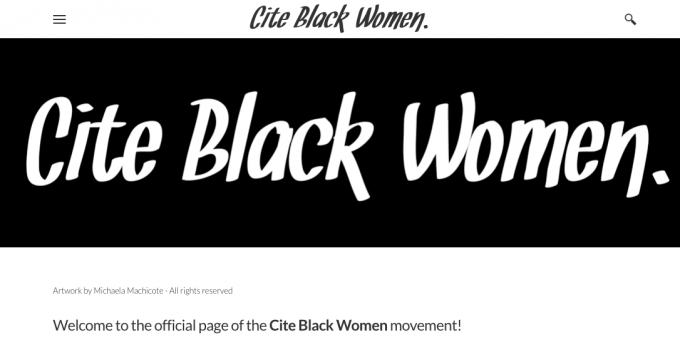
The homepage of CiteBlackWomenCollective.org.
Yes, Sociology Is Racist, Too
There is no doubt that elitism and power structures exist within the field of sociology. In their 2018 Sociology of Race and Ethnicity article, David Brunsma and Jennifer Wyse emphasize the need to divest in the structure of Whiteness in the discipline. Titled “The Possessive Investment in White Sociology,” their work delineates how elitism, power, knowledge production, and race are interconnecting. As marginalized sociologists have noted for years, Brunsma and Wyse write, the production of knowledge and the reproduction of White supremacy are intimately bound.
White sociology treats knowledge production as an objective process, claiming a “value-free” approach. This, in turn, suggests a moral detachment from social issues and reinforces a separation of social activism from social thought. Yet as White sociology decontextualizes its racialized history, Black sociology analyzes race as a fundamental force, challenging racism and oppression by using knowledge as a tool toward freedom and empowerment.
Further, they write, White collective identity and memory is both colonial and forgetful. By supporting White institutions of knowledge production (like the Chicago School) while excluding sites of explicitly Black radical thought (like the Atlanta Sociological Laboratory), White sociology has practiced erasure. White logic and methods are considered “mainstream” scholarship, dominating in graduate departments, high school classes, and the American Sociological Association. This possessive investment in White sociology reproduces racial inequality in publishing and writing via the peer review and citation practices. Thus, Brunsma and Wyse urge sociologists to read, engage with, and cite the work of Black women and other marginalized scholars of color in order to decolonize their discipline.
To fully understand elitism in our own discipline, sociologists must recognize the racialized history of who gets to produce knowledge and why. Without thinking critically about race in scholarship, sociological scholarship holds little actionable value for public policy and discourse. The field must become committed to decolonizing the racist structure of White supremacy and its exclusionary practices.
